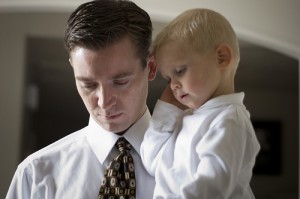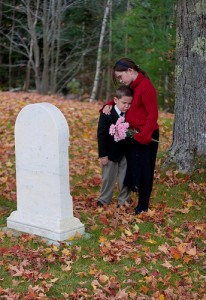As a parent, the emotional health of your child is always at the forefront of your mind. When a family member or friend passes, it is natural for you to be concerned about their involvement in the funeral services. You may be feeling grief, anger or even guilt and fear that your child will experience the same difficult emotions. In the past, it was considered unwise to allow a young child to attend a funeral, primarily based on the high emotions and fear of death it may create. Today though, most funeral homes, psychologists and parents see the funeral as a chance to provide closure for a child who has lost someone they care deeply about and to shed light on the mysterious, and often frightening, concept of death. FSN Funeral Homes has taken the time to list a few considerations you should make when choosing whether or not to allow your child to attend a funeral.
Is my child old enough?
Age is possibly the greatest concern for most who oppose children attending funerals. Rabbi Earl Grollman, a bereavement specialist and chairman of the National Center of Death Education at Mount Ida College, suggests that, “If a child is old enough to go to church services, that’s old enough to go to a funeral.”
On the other hand, Hospice of the Valley finds that, “When deciding whether your child should attend a funeral or memorial service, age is not the most important consideration. Your child is part of the family, and children who are old enough to love are old enough to grieve.” From their perspective a healthy grieving process should be supported in all ages.
The primary concern you should truly have is the maturity level of your child. Can he or she remain quiet? Is your toddler too restless to sit through a service? Will your child remain respectful of others? Decide whether or not your child will disturb others during their mourning. Remember, kids are kids and you cannot expect them to listen intently to every speaker and song. If the child can be occupied by a quiet activity, this would be an appropriate distraction.
How close was my child to the deceased?
If you feel that your child has a meaningful bond with the deceased, that their loss will affect them personally, then there is good reason to allow your child to attend the funeral. Just like adults, children need closure.
The funeral serves the same purpose for children as it does for adults. The shared mourning and celebration of life are crucial to a healthy acceptance of their loved one’s passing. Phyllis R. Silverman, a psychologist who has conducted research concerning children who attended a parent’s funeral, stated that she found among those children she interviewed a generally positive perspective. “They were pleased that there were many people at the funeral who cared for their parent. They talked about the importance of remembering, celebrating their parent’s memory and mourning together. The funeral helped them do that.”
Many parents and psychologists have also found that children appreciate being included in the funeral plans of someone dear to them. Choosing the casket or deceased’s dress is often offered as good ways to involve them in the decision-making process. You could also suggest they write a letter or draw a picture to be placed in the casket.
Does my child want to attend the funeral?
While it may seem strange to allow your child to make this decision, giving your child the power of choice will provide them with confidence and control in a time when they are feeling powerless.
If your child is uncertain whether or not they wish to go, there are several reasons they may be hesitant. They could have unanswered questions or unfounded fears. For example, Barbara F. Meltz, a child care journalist, explains that referring to the deceased’s “body” may unwittingly create a fear of a headless loved one. They may not understand the gravity of the situation and find personal, selfish things more appealing – like thinking, “Why would I spend my Saturday with old people? I want to play ball!”
Do not make the child feel guilty for not wanting to attend, simply ask them why they don’t want to. Address any concerns they mention honestly and sincerely. Additionally, many psychologists recommend encouraging the child to attend. Emphasize the family aspect of the service and the reasons funerals are held – showing respect, celebrating life, and grieving with family.
If your child does choose to attend the funeral, encourage him or her to ask questions and assure them that you want to know how they are feeling. Conveying openness and a willingness to work with your child will give them the support they need to address their grief. Make sure to thoroughly explain what will happen during the funeral so they fully understand what will take place, eleminating any fear of the unexpected.
The Key to Protecting Your Child
As an adult, you understand what has happened to a deceased loved one without attending a funeral, but a child has no concept of such things as a casket, grave, or burial if you do not educate them. Imagine never knowing what has happened to a loved one; this is how your child could feel if they are not familiar with the concept of death and funerals. The best method to ensure your child will be ready for a funeral is to prepare them yourself. Do not avoid answering questions, but reward curiosity with enthusiasm. This preparation should address the following aspects:
- The Funeral Service – Hospice of the Valley suggests you make sure the 5 W’s and H are answered for the child when addressing the funeral service (Who, What, When, Where, Why and How).
- The Concept of Death – Death’s permanence, the separation from a loved one, and the physical body may be difficult concepts for your child to understand. Be straightforward and avoid euphemisms which may be confusing to your child.
- The Emotional Aspect – Describe how some people may be acting at the funeral – crying, quiet, etc. – and open up to your child about how you feel. Most importantly, make sure your child is comfortable with his or her own feelings. Let them know that reacting emotionally is natural, but also that he or she will not be expected to act like everyone else. Everyone mourns differently. Encouraging your child to write, draw, or talk out any feelings they are having is a good way to gauge how they are reacting to the experience.
If you find discussing any of these issues difficult, there is no need to worry. There are plenty of resources out there to help you educate your child on all aspects of death – from the funeral to grief. Also, when you find the funeral home which will be holding the service, contact the director. Sometimes they will have special services just for children or at least will be prepared to answer any questions your child may have.
“I hear people say the funeral would be too hard on them. They are not allowed to say good-bye to loved grandparents because the experience might traumatize them. In our efforts to protect, we leave it to their imaginations. That which is left to the imagination is an invitation to nightmares and struggle.”
– Doug Manning, in The Funeral: A Chance to Touch, A Chance to Serve, A Chance to Heal
While it would be easier to look at this decision as if it were black and white, it’s not. This issue truly is a personal decision based on your individual child – and it should be individually based on each child you have. Though the parental instinct wants to immediately protect your child from such a tragic event, opening up to your child about what is going on is the best way to protect them. As Manning said, avoiding the topic of death simply makes it a more terrifying idea. Children will try to explain their world in whatever way they can, even death, so leaving them uninformed is simply leaving room for fear. Whether or not you find attending a funeral would be right for your child, you should take the time to explain to him or her what is going on. Most importantly, ensure that your child does not feel isolated. Make sure they understand what is going on, know that there are people they can reach out to, and let them know that their opinions and feelings matter to the family. Taking the time to reassure and educate your child could make all the difference in how they deal with the loss of a loved one.
Other Resources for Your Consideration:
- The Funeral: A Chance to Touch, A Chance to Serve, A Chance to Heal by Doug Manning
- “Explaining the Funeral/Memorial Service to Your Child” by Hospice of the Valley
- “Should you take a child to a funeral?” by Barbara F. Meltz
Father and Son photograph from Kelly B. on Flickr.
Children at Grave photograph from Kratka’s Photography on Flickr.
Girl at Candle Vigil photograph from The U.S. Army on Flickr.
Tags: Coping, Grieving, Grieving Children


